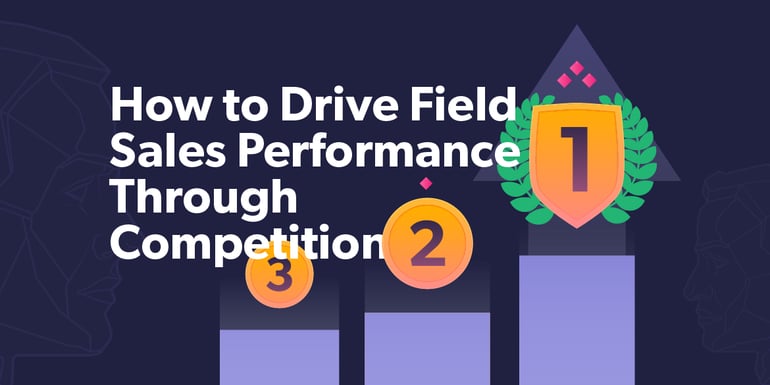A successful day in the life of a field sales rep starts early and is constantly on the move. Being such a uniquely siloed role, field team leaders are constantly looking for new ways to excite their teams and increase performance levels when out in the field.
While competitions are commonplace for most sales teams, brands are now applying the same concepts to motivate and incentivize their field teams. In this blog, we’ll explore four ways field teams can foster friendly competitions that build team camaraderie, improve performance in the field, and drive growth in every account.
Set Up Contests
A great way to promote healthy competitions on your field teams and throughout the company is by setting up contests that reward your top performers or teams. Even in a remote role spent mostly in the car, field teams feel more connected and supported when competing with and against each other, even if it’s just for fun.
By getting creative with team assignments, like comparing performance between territories or retail banner teams, field team managers can mix up the competition while shifting focus to align with their strategic objectives each quarter (i.e. growing new doors in a specific territory or winning off-shelf placements at Whole Foods). provide regular updates to keep reps and territories motivated and informed on the activities where they can improve performance, and hopefully win the competition as well.
Some field leaders even are creating scoring methodologies in their retail execution platforms for their top KPIs, awarding various point amounts for completed field activities. Using this scorecard system, they can quickly see who the top overall reps and teams were in the field and can easily sort to see the top performers by each KPI. This gives brands a clear picture of how the business is performing, who the top field performers are, and who may not be living up to their full potential yet.
Just remember to set goals for your entire team, keep every rep apprised of their progress, and reward your champions to keep them incentivized to push for even higher goals.

Leverage Leaderboards
One of the most effective ways brands and field teams track and improve rep performance in the field is by building leaderboards for their key performance metrics, like Facings Won, Competitors Displaced, and Cases Packed Out. Typically, team leaders have set criteria to evaluate team performance and, in many cases, have a weighted score assigned to ensure a fair comparison of each reps’ efforts across each territory or region.
Having a system in place to automatically track and report these metrics based on the work that gets done in the field is important because it gives everyone a chance to check their progress during the course of the competition and turn up the effort as they go, instead of just finding out about the results at the end of the quarter. Make sure to regularly share this information with your field team and reward individual contributions for in-store KPIs.
Strive for New Individual Benchmarks
Whether they’re at the top of the leaderboard or in the middle of the pack, running sales contests gives managers a chance to discuss individual performance with every rep and help coach them to hit new personal performance milestones.
Building detailed rep scorecard reports as a part of your competition enables team leaders to drill down to see how each team, territory, and rep impacts coverage in the field, and answer the question: How can I make my team more productive?
With detailed insights on daily productivity, including time worked, visits made, and time spent in-store, Repsly’s Rep Scorecard reports make it easy for team leads to start those coaching conversations with data, so they can help the team accomplish their best work. Weekly or monthly check-ins with individual reps and field teams provide a perfect chance to course-correct and re-train any areas that need attention.
For example, a rep may have completed 33 visits, but when the manager reviews those visits they notice the rep is doing fine in terms of the number of cases won, and displays and facings all look good, but voids and overall visits seem low. This presents a good opportunity to find out what was slowing the rep down and not allowing them to close on the voids.

Understand Business Performance
At the end of the day, every sales contest needs to be connected to the business’s strategic goals — especially if it’s attracting the attention of your reps in the field for a week or two at a time. Before you start designing your next competition, make sure you have a way to track the impact it’s having on the performance of your team relative to your strategic goals.
For some teams, that might mean measuring the team’s total visits to a specific retailer or total cases sold of a new SKU, For others, sales velocity is the most important metric. Those teams need to be prepared not only to measure sales velocity before and after the contest but also to connect specific activities to sales lifts in specific accounts.
Retail execution platforms like Repsly make it easy for field sales teams to connect data about their activity in the field with sales velocity in key accounts or product performance on the shelf. No matter what your team’s specific objectives are, make sure you have a system set up to track results before investing in your next field sales contest.
Better retail execution starts with better data. Manage your field team more intelligently with next-level insights on their performance in the field. Check out this ebook to discover the three types of data powering high-performing retail execution teams.
.png?width=640&name=3%20Types%20of%20Data%20(1).png)





.png?width=640&name=3%20Types%20of%20Data%20(1).png)


